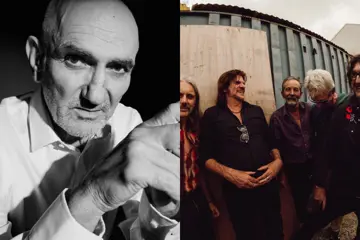Melbourne's Curse Ov Dialect is no longer "an oddity" in hip hop. Their politically progressive platform, eclectic music and eccentric theatricality is in vogue. Today, following Kanye West's rise, avant-garde rap is mainstream, while the Australian urban scene has never been more pluralistic. As such, COD's ambitious comeback album, Twisted Strangers, is astutely timed.
Curse Ov Dialect's current members — MCs Raceless, Volk Makedonski and Atarangi, plus DJ/producer Paso Bionic — all hail from divergent cultural backgrounds. The ensemble ushered in an alternative to suburban barbecue rap in the '90s. Determined not to replicate an American hip hop "aesthetic", COD developed their own psyched-out variant through experimentation — beginning with unusual global samples. They also introduced a carnivalesque live show, complete with costumes. But, though Curse Ov Dialect became "weirder", their mission didn't change.
"I think we just got more abstract as we got older because the frustration of people not listening to where you're coming from forces you in an abstract direction sometimes."
"The whole reason we started making hip hop was because we wanted to diss racism," says founding MC Raceless, aka Adam Gauci. "I think we just got more abstract as we got older because the frustration of people not listening to where you're coming from forces you in an abstract direction sometimes." Gauci, who has a Maltese father, chose a pointed alias in "Raceless". "I don't know if I like the name any more but, when I was younger, I had a real hatred for racism and didn't wanna be part of the human race."
Uniquely fresh, Curse Ov Dialect was the first Australian hip hop group to sign to a US label, issuing 2003's Lost In The Real Sky on the cred indie Mush Records. They built an international fanbase by touring solidly. COD last dropped Crisis Tales on Mistletone in 2009. Then life intervened. "Some of us became fathers, some of us went overseas," Gauci explains. Still, Curse Ov Dialect felt they had more to share — Gauci considering Twisted Strangers "therapeutic".
Don't miss a beat with our FREE daily newsletter
Last September Curse Ov Dialect generated blog buzz with the album's title track — which features Hemlock Ernst, the rapper alter-ego of Future Islands' mercurial frontman Samuel T Herring. He'd cited Curse Ov Dialect as a fave Aussie act in a triple j interview. "I just hit him up on Facebook," Gauci says. "I was like, 'Thanks for mentioning us, man, that's awesome — we should do a track!' Then he said, 'I'm gonna rap on it.' I'm like, 'Ok, cool!' He's a dope MC as well — perfect… He didn't care that we weren't big anymore — very, very humble guy." Herring shot footage for a video in his Baltimore hometown, and, because of his involvement, Pitchfork premiered the clip, affording Curse Ov Dialect unprecedented exposure. "Can you imagine some of the reactions from the Future Islands fans when they see us doing our shit on there?," Gauci laughs. Curse Ov Dialect and Herring performed the song together on Future Islands' November tour here.
With Twisted Strangers Curse Ov Dialect tackle race, gender, sexuality, identity and environmentalism — Mountain Pressure even critiquing minstrelsy in hip hop. Nonetheless, Gauci questions Curse Ov Dialect's classification as "multicultural" — growing up out west in Sunshine, the term always seemed disingenuous. "The whole idea of 'multiculturalism' to me was foreign," he says. "It was like, 'This is just normal.'" Yet Gauci can understand how Curse Ov Dialect might appeal to new school as much as old school hip hoppers. "It's weird — we're hip hop purists that don't do what people think of as pure hip hop."















